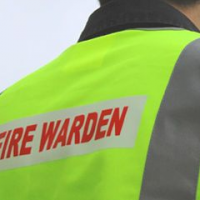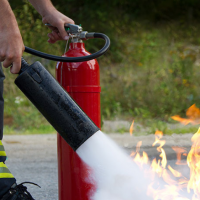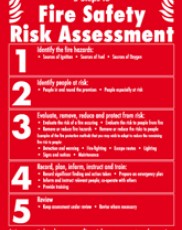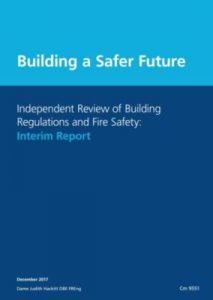Fire Risk Assessments for Organisations
Under our facilities management services, we are now able to offer a full Fire Risk Assessment service.
Training for Fire Awareness, Fire Wardens, Fire Extinguishers
Air Intelligence can offer a range of on site training services including fire warden, fire awareness and fire extinguisher training. Additionally, hot works, hot works fire watch and welding safety training can be provided to suit the needs of your organisation.


Fire Risk Assesments
Compliance with the requirements of the Regulatory Reform (Fire Safety) Order 2005 requires a suitable and sufficient fire risk assessment (FRA) to be produced by a suitably competent person. SFE offers Nationally accredited fire risk assessors to carry out such assessments.
Controlling fire risks is an important part of managing a property. In order to be able to protect against the risks of fire, the first step is to identify these risks and this is where the fire risk assessment comes in. A legal demand for all ‘non-domestic’ premises, fire risk assessments (or FRAs) are a snapshot of how protected any given property is to ensure the safety of its occupants in the event of a fire. The FRA also identifies corrective actions and further steps to achieve an appropriate level of fire safety.
The Regulatory Reform (Fire Safety) Order 2005 (commonly known simply as the Fire Safety Order) introduced a legal duty for ‘the responsible person’ to take all reasonable steps to ensure that fire safety levels are appropriate at all times. The segment within the legislation focussing on fire risk assessments opens with the following:
Risk assessment
9.—(1) The responsible person must make a suitable and sufficient assessment of the risks to which relevant persons are exposed for the purpose of identifying the general fire precautions he needs to take to comply with the requirements and prohibitions imposed on him by or under this Order.
This legislation applies to all non-domestic properties including commercial and public premises, such as shops, factories, warehouses and offices, but also schools, nursing homes as well as businesses providing sleeping accommodation. It also applies to sheltered housing as well as the communal areas of blocks of flats and houses in multiple occupation (HMOs); though not to the individual dwellings within the HMO.
For businesses employing five or more employees, there is a legal requirement to not only carry out a fire risk assessment, but to document the findings in writing. Fire Risk Assessments can be carried out by the organisation or business affected. There are official fire risk assessment help guides available and FRA forms can be downloaded for free from a number of sources.
Please be aware, though, that the person carrying out the assessment has to have sufficient training to make judgements about the fire risks and the solutions required. The potential punishment for failing to meet your duties in relation to fire risk assessments is a prison sentence of up to two years, as well as an unlimited fine. Therefore, if you have doubts as to your ability to carry out an FRA it is highly recommended to engage the services of a professional fire risk assessor to ensure you comply to all relevant regulations.
Areas that need to be considered in almost all fire risk assessments are fire detection systems, emergency exits and routes (including evacuation plans), firefighting equipment and the availability of information and advice to the building’s occupants.
Issues such as the specific needs of vulnerable people and the safe storage of any dangerous substances must also be considered. However, these may not always be a relevant factor for the fire risk assessment depending on the use of the building.
Please note that any changes to the occupancy or activities within premises must be reflected in the fire risk assessment, meaning the document should be reviewed regularly and updated if needed.
Generally, a smaller business is more flexible, while larger businesses, or those with wider ownership or more formal structures, will usually tend to be organized as corporations or (less often) partnerships.





